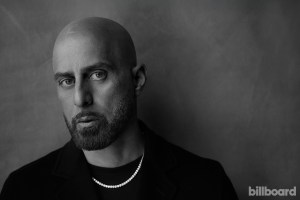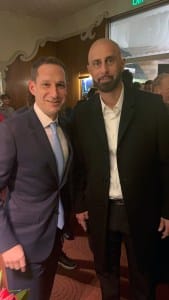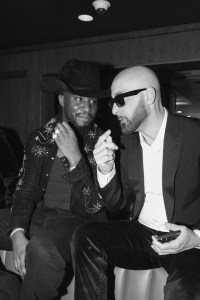
Hermès coat and shirt
Austin Hargrave
It’s an early evening in late September, and San Francisco is gleaming. The back patio at EMPIRE’s recording studios near the city’s Mission District is all white marble, reflecting the last rays of the setting sun as dozens of YouTube executives mill about, holding mixed drinks and picking at passed trays of beef skewers, falafel, lamb dumplings, and ham and chicken croquettes. At the moment, the companies’ top executives — EMPIRE founder and CEO Ghazi, COO Nima Etminan and president Tina Davis, as well as YouTube global head of music Lyor Cohen, among others — are sequestered in the studio’s live room for a quarterly business review, discussing the platform’s new tools, the label’s upcoming projects and how the two can best work together. A cake is adorned with YouTube’s latest milestone: 100 million members of its music subscription service.
Inside, the aesthetic is flipped: Black walls, dark wood floors and a black marble bar set the tone, while a projection screen in the main lounge area shows photos of Nigerian superstar and recent EMPIRE signee Tiwa Savage, who is in town finishing her new album. As Ghazi, Cohen and the others wrap their meeting and begin to filter into the party, everyone is ushered inside to hear her play some of her new music.
“This is my first project at EMPIRE, and it’s really emotional for me because I’ve never had a label be this invested; most labels are not in the studio with you from morning until night,” Savage says before introducing her first single from the album, “Forgiveness,” which she will release a couple of weeks later. “They made me feel so welcome. I’ve been signed several times, but I’ve never been in a situation where it felt like home.”
The next day, at a barbecue restaurant near the studio, Ghazi is reflecting on the event — and what the connection with YouTube’s Cohen means to him. “I used an analogy with Lyor: ‘This is not a full-circle moment; this is the Olympic rings of full-circle moments,’ ” he says. “This brings so many circles of my life into place. I started as an engineer; I’m in a state-of-the-art studio that I could only dream about that I built with my bare hands. I used to listen to Run-D.M.C. — he found Run-D.M.C. The first tape I ever bought was Raising Hell — now I’m raising hell in the music business.” He laughs. “I prefer to call it ‘raising angels,’ but it’s cool. And then you have a giant like him in the record business that people used to blueprint their careers after, and now he’s telling me that he’s proud of the success I’ve had and that he watched me build a legacy. That’s validation.”
For Ghazi, 48, validation has seemingly been everywhere of late. The company that he founded in 2010 as a digital distributor for his friends in the Bay Area hip-hop scene has grown into one of the most formidable and powerful companies in the global music business. It has a record label, publishing and content divisions, a merchandise operation and 250 employees around the world, with a presence on six continents and deep connections to the local culture, politics and sports, including the Golden State Warriors and the San Francisco 49ers.
And now, as EMPIRE turns 15, it’s coming off its best year yet: For 19 nonconsecutive weeks, spanning from mid-July to the end of November, EMPIRE artist Shaboozey held the top slot on the Billboard Hot 100 with “A Bar Song (Tipsy),” tying the record for the chart’s longest-running No. 1 — an enviable achievement for any label, but particularly for an independent without any outside investment or corporate overlords. Shaboozey landed five nominations at the 2025 Grammy Awards, including best new artist and song of the year, redefining what is possible for an indie act and company in the modern music business.
Even more notably, that success arrived during a year when all three major labels experienced a painful and layoff-heavy molting process, reorganizing themselves to emphasize speed, technology, artist services and distribution — or, to put it another way, to try to look a lot more like EMPIRE. (“I think the battleship has been observing the speedboat for quite some time,” Ghazi says.) Amid those changes in the business, a new school of thought has emerged: that success is often found in cultural niches that gain mainstream acceptance from the bottom up, not the top down. Ghazi embodies that change: He may not have the mainstream name recognition of his peers in New York or L.A., but in his force of personality — humble yet emphatic, as many successful founders are — and his tireless, globe-trotting pace, he fits right in among the elite movers and shakers of the business.
“This industry used to be full of super-colorful entrepreneurs that were focused on their art, and when you talked to them, they had a certain excitement and shine in their eyes. Unfortunately, there’s not that many of them [left],” Cohen says about Ghazi. “I would call him one of the few. A person that is committed to excellence, cares about the details, shows up, has continuity and he’s positive and enthusiastic.”

Hermès coat and shirt
Austin Hargrave
There’s another reason why the YouTube party held such significance for Ghazi: The video streaming service is another company born, bred and based in the Bay Area that grew into a music industry behemoth after being built on tech foundations. Ghazi worked in Silicon Valley, including at an ad-supported video streaming service half a decade before YouTube, prior to dedicating his life to music, first as a recording engineer and then at digital distributor Ingrooves. He then founded EMPIRE — and sees his company as part of that lineage. “I’ve never met a music exec that has such a grip on the three verticals — creative, business and technology — and is fluent in all of it and active in all of it,” says Peter Kadin, a major-label veteran who is now executive vp of marketing at EMPIRE. “Someone who can go from meeting with an engineering team about building out the future of our systems, to sitting with finance and going through our deal structures with all the major DSPs [digital service providers], to going to the studio at night and mixing a Money Man album. There is no other executive doing that.”
Ghazi’s tech background and San Francisco’s reputation as the center of the tech industry are among the many reasons why he has always maintained that EMPIRE will never leave the Bay. The area has been part of him since he grew up in San Francisco’s Potrero Hill neighborhood, during his days at San Francisco State, throughout his time in the trenches of the local hip-hop scene and even now, when he has the ear of the new mayor of San Francisco, Daniel Lurie, whom he’s advising on cultural matters, and is working hand in hand with the NBA and the Golden State Warriors to produce events and release projects surrounding the upcoming NBA All-Star Weekend, which will be held in the Bay Area in February for the first time in 25 years.
But for a city that has had its share of big music moments and in which several major companies got their start, San Francisco’s music, and music tech, scenes have receded over the last two decades, with many companies lured away by the brighter lights and easier connections that exist in New York or Los Angeles. It’s a fate Ghazi is determined to avoid for EMPIRE — and a trend he’s actively working to reverse.
Ghazi likes to tell a story about when he was in his 20s in the early 2000s and mixed The Game’s first mixtape at San Francisco’s Hyde Street Studios. The project, which came out in 2004, ultimately helped Game get signed to Dr. Dre’s Aftermath Records, and when Dre and one of his executives heard the tape, they wondered who had mixed it because it sounded much more professional than the typical lo-fi promotional tapes making the rounds among underground hip-hop heads at the time. The guys invited Ghazi down to L.A. and encouraged him to move to the city and start working with them.
“I was flattered by it, but I was also furious — mad that I had to leave the Bay to build a music career,” he recalls. “I remember driving past the Capitol Tower like, people drive past this building and think, ‘I’m going to work there one day.’ And we don’t have that in the Bay. And I was like, ‘That sucks! I’m going to figure this s–t out!’
“It took me a long time — a really long time — but I figured it out.”

Prada coat, shirt, pants and shoes.
Austin Hargrave
“This might be the most mellow day I’ve had in three months.”
A few weeks later, Ghazi is driving through the streets of San Francisco, giving the signature tour of the city that he offers to anyone new in town — or anyone who may have only heard of its downtown blight and violence as depicted by the national news. It’s another beautiful fall day in the Bay, the first vintage weather after an extended heat wave, and he has cleared his schedule for the afternoon. For the next four hours, he unspools the history of the city neighborhood by neighborhood, street by street.
From the EMPIRE office in the Financial District, he drives into Chinatown, then to the Marina District and the picturesque Palace of Fine Arts. After that it’s into the Presidio, where Lucasfilm is headquartered, then over the Golden Gate Bridge into Sausalito, stopping at an overlook for a view of the city. Then it’s back across the bridge into San Francisco, along Baker Beach into Sea Cliff and then Richmond District, the neighborhood where Ghazi lived in a 350-square-foot apartment when he was first dreaming up what would become EMPIRE. (“I had like four f–king jobs,” he says. “Some of the happiest times of my life, though. Some of the most stressful, but some of the happiest.”)
Along the way — passing through Lands End lookout point, Golden Gate Park, the Haight-Ashbury district and Billionaires’ Row, down the famously crooked Lombard Street and into the Mission — he calls out the landmarks of his life: the apartment where he was born, his first recording studio, the place he got his first boba milk tea, the theater where he used to watch movies for two dollars, the Haight storefront where he once co-owned a clothing store, the place where he and Etminan built the wiring for the first EMPIRE office through a hole in the wall. After a few hours, he parks near the water and gets out of the car to take it all in.
“They say San Francisco’s a doom loop,” he says, looking across McCovey Cove into Oracle Park, home of the San Francisco Giants, in the late-afternoon sun. “This look like a doom loop to you?”

Louis Vuitton sunglasses and jacket
Austin Hargrave
San Francisco is personal to Ghazi in a way that goes deeper than the typical nostalgia people feel for home. And the recent right-wing news coverage by 24/7 cable networks — which has portrayed the city as crime-ridden and drug-addled, overrun by a persistent homelessness problem that the city has not been able to handle — that has proliferated in recent years has spurred him and other music leaders in the city into action.
“San Francisco had such a heyday up until the pandemic, and it’s been really hard to watch the world s–t on our city,” says Bryan Duquette, founder of Another Planet Management and a member of the core executive team at Another Planet Entertainment, the San Francisco-based independent promoter that puts on the Outside Lands music festival and operates Bay Area venues including Berkeley’s Greek Theatre and San Francisco’s Bill Graham Civic Auditorium. Duquette, who has lived in the Bay for over 20 years, met Ghazi in 2023 and found a kindred spirit determined to rectify the negative perceptions held by outsiders. Last year, Another Planet teamed with Ghazi, EMPIRE and artist management company Brilliant Corners to assemble 100 members of the Bay Area music scene to meet with Lurie, then a mayoral candidate, to discuss his plan to reinvest in the artistic community. “Daniel really was trying to get to the people who were creating culture and helping the city become, again, what it was seen as globally,” Duquette says. “And Ghazi is a really big piece of that.”
Lurie’s outreach ultimately won him much of the creative community’s support, and in turn helped win him the election; he was sworn in as the 46th mayor of San Francisco in January. “The arts and culture have always defined us, and I firmly believe that EMPIRE and Ghazi are going to be part of the revitalization of our city,” Lurie says. “He knows what’s going on in the music world better than just about anybody, and I’ll be listening carefully to his guidance and his counsel.”

San Francisco Mayor Daniel Lurie and Ghazi in 2025.
Courtesy of EMPIRE
EMPIRE’s fierce independence, too, is an expression of the Bay’s ethos. “He’s a representative of the independent grind and the culture here; that’s something that everyone in the Bay can resonate with, just coming from the ground up and being the underdog,” says P-Lo, the Bay Area rapper who has been with EMPIRE since 2017. (P-Lo is spearheading a project with the Golden State Warriors’ content division, Golden State Entertainment, that will be released ahead of NBA All-Star Week and distributed by EMPIRE and will feature more than a dozen Bay Area artists.)
But that independence, and particularly the eye-opening success that EMPIRE has experienced over the past few years, has also brought scrutiny — and tests of Ghazi’s commitment, particularly during a time of intense consolidation in the music business. When a media report circulated in November 2023 positing that LionTree was lining up a $1.5 billion bid to buy EMPIRE — “Most believe Ghazi is not a seller, but big checks have changed other people’s minds,” the report needled — Ghazi was furious and sent a staffwide email emphatically denying it, according to multiple employees. A week after EMPIRE’s YouTube event, he was even more publicly defiant, insisting while onstage in October at the industry conference Trapital Summit in Los Angeles: “I’m not for sale. Period. I am dead serious. I am living my purpose. There’s no price on that.”
It’s a frustrating topic for Ghazi, not least because it implies a fundamental misunderstanding of who he is and why he does what he does. “You don’t understand — I just don’t care about money,” he says. “It’s not my motivation.” Instead he talks about the principles instilled in him by his father, a Palestinian refugee who brought his family to America to put them in a position to control their own paths if they were willing to work for it. “I don’t see myself ever working for somebody else,” Ghazi continues. “I’d rather retire. There’s no price for my autonomy. It’s the greatest gift to a leader.”
Still, his insistence on sole ownership — and the sheer force of personality that he exudes in binding the company together — has left enough of an opening for industry analysts to wonder about succession planning, about what might happen to the company when, or if, Ghazi decides to hang it up. He freely admits he won’t stick around as a hands-on CEO forever, but also that EMPIRE is about legacy for him and that he values legacy and autonomy — the freedom to chart his destiny — more than anything else. In that sense, he’ll never truly leave EMPIRE, even as the rumor mill keeps churning. “I always admired athletes who retired when they were on top. I want to be at the top of my executive game when I quit,” he says. “I don’t want to be the guy who hung on for too long. I’m already the owner, so I could still hang around as a chairman, but I don’t need to hang around as the guy running s–t day to day.”

Austin Hargrave
But that’s not happening anytime soon. In the past six months alone, EMPIRE has expanded into Australia, East Asia and South Africa and completed the acquisition of Top Drawer Merch to bring another monetization vertical into the fold for its artists. Ghazi is engaged in the industrywide debates surrounding superfandom revenue and is constantly seeking new opportunities; the two weeks prior to this driving tour, he had been in Tokyo, Seoul, Beijing, Cambodia, Singapore, Bali, San Francisco, Paris, Marrakesh, Singapore again, Seoul again, Las Vegas, Seattle and back to San Francisco: taking label meetings, shooting music videos, meeting with DSP partners, attending conferences and awards shows and directing work on the EMPIRE studios here, with the goal of expanding the company’s reach step by step — taking the stairs rather than the elevator, as he puts it.
“The goal is to be in all the places that make sense for us culturally,” he says. “Is the music interesting? Is the culture interesting? Holistically, how does it play with our DNA? What’s the cost of acquisition and retention? Do I like the music here? But the initial fuel is the passion; then, from there, start to figure it out.”
Joice Street is mobbed. The Nob Hill alley, around the corner from the Bruce Lee mural that adorns the wall next to the Chinese Historical Society of America Museum, is the location this afternoon for P-Lo’s “Player’s Holiday ’25” video shoot, and dozens of people, including some of the Bay’s biggest rappers — Saweetie, G-Eazy and Larry June among them — are filming on a basketball court on the roof of a building overlooking the city. Ghazi is there, not just because EMPIRE is distributing the song, which will appear on P-Lo’s album with Golden State Entertainment, but because he’s scheduled to make a cameo in the video.
Ghazi spends more than an hour on the rooftop, where he seemingly knows everyone — and everyone wants a minute of his time. But soon he heads back to the studio to return to work. The vibe there is low-key, but a typical cross section of artists and creatives are at work: Nai Barghouti, an Israeli-born Palestinian singer, flautist and composer, is in Studio C, working on songs for her new album before heading back out on tour; two producers from dance label dirtybird, which EMPIRE acquired in 2022, are in the live room, “ideating the next big hit of 2025”; a regional Mexican group sits on the patio outside, figuring out songs on a guitar; YS Baby from EMPIRE-owned viral content aggregator HoodClips (which has over 11 million followers) is talking about the podcasts he has lined up. Later, Japanese rapper-singer Yuki Chiba — whose 2024 collaboration with Megan Thee Stallion, “Mamushi,” reached No. 36 on the Hot 100 — takes over Studio A, where he plays a slew of songs slated for upcoming projects and discusses rollout plans.
EMPIRE may have gotten its start in Bay Area hip-hop and made waves on the front lines of West African Afrobeats, but these days it embodies the global outlook that Ghazi always envisioned; Shaboozey’s “A Bar Song (Tipsy),” after all, is a country crossover hit out of Nashville that reached No. 1 in 10 countries. EMPIRE partnered with Nashville-based indie promotion company Magnolia Music to handle its country radio campaign, and from there the single branched out to other formats, ultimately becoming the first song in history to go top 10 on four different Billboard airplay charts: country, top 40, adult top 40 and rhythmic. And Ghazi sees himself as a global citizen helping people around the world — “creating microeconomies” within the territories EMPIRE operates, he says — not just within the confines of the Bay Area.

Shaboozey and Ghazi at the 2024 CMA After Party.
Becca Mitchell
He is also the highest-profile Palestinian executive in the music business and has openly condemned the humanitarian crisis that has erupted during Israel’s war in Gaza. His Instagram profile picture is the Palestinian flag; he regularly shares videos and photos decrying the violence against civilians; he helped facilitate the remix to Macklemore’s track dedicated to Palestine, “Hind’s Hall,” and went to Seattle in October to support the rapper at a Palestinian benefit concert, despite Macklemore not being an EMPIRE artist. He stresses that he does this on a personal level, explicitly not to politicize the company. When asked if he feels a responsibility of sorts, given his profile, to help raise awareness about that humanitarian crisis, he simply says, “I feel like I want to be proud of the man in the mirror.” (“He’s Palestinian and I’m Israeli; we shared our great pain and anxiety over what’s happening in the Middle East,” says Cohen, who also calls Ghazi “a genuinely good guy.”)
But despite its global activities, EMPIRE has stayed focused on its local roots — and is continuing to strengthen them, too. In 2020, it started putting on the cultural festival 415 Day (which takes its name from a San Francisco area code) and has gotten further into live events through its deepening relationship with Another Planet. The San Francisco studio has become not just the creative center of EMPIRE’s operations but also an event venue for the city’s music and civic communities. And in a massive move in January, EMPIRE purchased the 100,000-square-foot historic Financial District building One Montgomery, built in 1908, for $24.5 million, according to The San Francisco Business Times; Ghazi plans to move the company headquarters there after renovating it. Eventually, One Montgomery could become the San Francisco version of the Capitol Tower that Ghazi envisioned all those years ago.
“There have been so many times that people have told him he couldn’t do something, and then he was able to do it, that it gave him all the fire and was the catalyst for him to be the person he is today,” says Moody Jones, GM of EMPIRE Dance, who has been with the company since 2018. “They told him he was crazy to have a music company in San Francisco; that he would never compete with a major; that he would never get out of hip-hop; that he would never open up a studio. They told him San Francisco would never be cool again. And every single time he was able to show them that, ‘No, I’m right.’ ”
That all builds into the larger cultural role Ghazi is playing in his city and beyond. Lurie just announced the inaugural San Francisco Music Week, a celebration of the city’s local music industry culminating in an industry summit with a keynote conversation with Ghazi. And while he says he’s not interested in San Francisco politics, he wants to be consulted from an advisory perspective on cultural events in the city and try to bring in more events beyond just music — Art Basel San Francisco is one that he has begun to advise on, though that project is currently on pause. He has worked with the city and the NBA on a slew of events around NBA All-Star Week and discusses the Super Bowl and World Cup in 2026 as further opportunities to showcase all that San Francisco has to offer. “For events like the NBA All-Star Game, Super Bowl LX, the World Cup, we get to show off all the greatness here, and Ghazi and EMPIRE and the artists they represent are part and parcel to what makes San Francisco so great,” Lurie says. “We need more Ghazis.”
Ahead of All-Star Week, he has made a series of moves and partnerships with the NBA and the Golden State Warriors, including with the game NBA 2K25, with which EMPIRE partnered for a first-of-its-kind deal that includes a limited-edition vinyl box set with 13 tracks by EMPIRE artists; EMPIRE artists on the game soundtrack; and Ghazi and some of EMPIRE’s artists scanned into the game itself. At the studio in September, he sat for an interview with NBA 2KTV host Alexis Morgan — who, to Ghazi’s delight, is also from the Bay Area — that will be part of NBA 2K25’s bonus features.

Ghazi (right) with NBA 2KTV’s Alexis Morgan.
Courtesy of 2K
But ultimately, it is all about the music. Shaboozey’s career is now in a superstar arc, and “A Bar Song (Tipsy)” will soon become EMPIRE’s fifth record with more than 10 million equivalent units in the United States according to Luminate, with over 1 billion on-demand streams. A few years ago, EMPIRE was flying largely under the radar, but Ghazi now has it at the top of its game, with a track record that speaks volumes in an industry based just as much on history as on what’s coming next.
“You always learn, all the time; you’re always adapting to what’s going on around you,” he says. “And sometimes you can’t believe how far you’ve come. But that only inspires you to go further.”

This story appears in the Feb. 8, 2025, issue of Billboard.